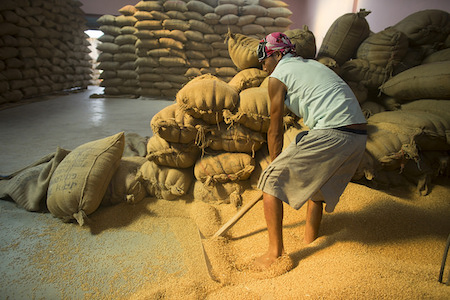
KATHMANDU, Nepal (CIMMYT) – Nepal’s push to grow its seed sector is expanding to banking, with new financial measures expected to benefit seed companies across the country.
Nepal launched its National Seed Vision 2013-2025 to improve food security by increasing its domestic production of high quality seeds, and make them available and affordable to farmers. The seed replacement rate, or the percentage of area using certified quality seeds rather than the farm saved seed, is set to increase up to 30 percent for cereal crops and over 90 percent for vegetables.
However, there is a lack of financing from formal sources across agricultural value chains, which led the country to mandate that banks allocate 10 percent of their lending – around NPR 1.3 billion ($12.7 million) – to agriculture in 2017.
A value chain is the full set of activities businesses go through to bring a product or service from conception to delivery, in agriculture, this could involve everything from the development of plant genetic material to selling the final crop at market.
Value chain finance refers to financial products and services that flow to or through any point in a value chain that enables investments that increase actors’ returns, as well as the growth and competitiveness of the chain. This could dramatically improve Nepal’s seed sector by giving farmers, seed companies and banks access to more resources to grow.
In fact, if banks financed just 30 percent of seed company working capital, it would give an extra $2 million to invest in research and development activities, such as variety development, quality improvement, maintenance breeding and other vital functions that are currently not carried out by Nepali seed companies. These funds could also be invested in infrastructure development such as storage and seed processing facilities.
Participants concluded at a recent consultative meeting on financing seed business in Nepal that soft loans – loans that have lenient terms like low interest rates or extended grace periods – to seed companies that charge a government-mandated 5 percent interest rate are an ideal way to provide this extra working capital. The commercial banks offering these loans would benefit by reaching more farmers, thereby expanding their customer base and would reach the government-mandated agricultural financing target.
The Nepal Seed and Fertilizer (NSAF) project provided a platform to banks and seed companies to share information and identify business opportunities to support NSAF’s seed system development approach during the meeting. Nearly 40 participants from national banks, seed companies and other governmental and non-governmental organizations participated.
Dyutiman Choudhary, NSAF coordinator, shared the overall seed system development approach of NSAF and the role of finance in seed business. An overview of successful cases and models of bank-seed company partnerships adopted in Asia and Africa was also given.
Banks requested additional information about risks in the seed business and sought guidance to assess and reduce risks associated to their loans. It was agreed that value chain finance through three-party agreements between banks, farmers and seed companies could be a viable approach that could be initiated immediately.
“Through this sort of agreement, seed companies guarantee they will purchase seeds from farmers,” said the Seed Entrepreneurs Association of Nepal Chair. “This guarantees a market for seed, minimizing the risk of market failure for banks.”
Four national banks so far have shown interest in partnering with the NSAF seed companies to finance seed production with soft loans. A proposed working group comprised of banks, seed companies and the Government of Nepal will provide strategic direction to finance seed business. NSAF will lead the working group to guide strategic decisions on financing seed business by sharing evidence based information, providing a common platform and catalyzing innovations to ease access to finance by seed companies.
The Nepal Seed and Fertilizer project (NSAF) is funded by the United States Agency for International Development and led by the International Maize and Wheat Improvement Center in collaboration with Nepal’s Ministry of Agricultural Development and private sector. Learn more about NSAF through this infographic and fact sheet from the U.S. government’s Feed the Future initiative.
 Capacity development
Capacity development 
